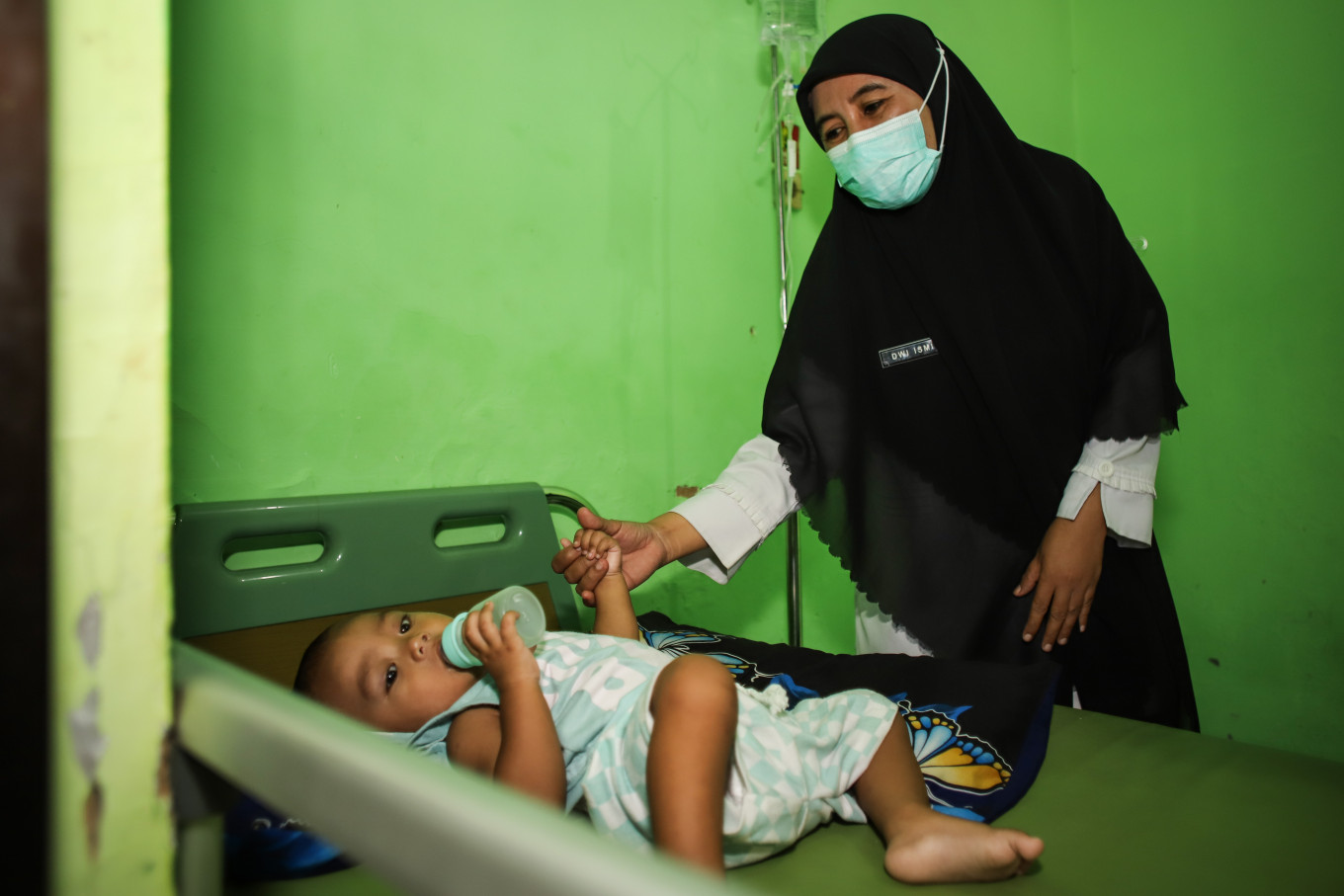Popular Reads
Top Results
Can't find what you're looking for?
View all search resultsPopular Reads
Top Results
Can't find what you're looking for?
View all search resultsForgetting healthcare basics
As the health system grapples with the unprecedented spread of misinformation, fueling vaccine hesitancy and eroding public trust in the government’s health programs, it is more critical than ever for the government to reinvest in the foundations of public health.
Change text size
Gift Premium Articles
to Anyone
 Health workers at Pragaan community health center (Puskesmas) examine a measles patient in Pragaan, Sumenep, East Java, on Aug. 27, 2025. The Health Ministry recorded measles outbreaks in 42 regions between January and the third week of August, with nearly 3,500 confirmed cases nationwide. Sumenep accounted for over 2,000 of those cases, including 20 deaths, the highest figure in the country. (Antara/Rizal Hanafi)
Health workers at Pragaan community health center (Puskesmas) examine a measles patient in Pragaan, Sumenep, East Java, on Aug. 27, 2025. The Health Ministry recorded measles outbreaks in 42 regions between January and the third week of August, with nearly 3,500 confirmed cases nationwide. Sumenep accounted for over 2,000 of those cases, including 20 deaths, the highest figure in the country. (Antara/Rizal Hanafi)
T
he recent death of Raya, a four-year-old toddler from Sukabumi, West Java, has sent shockwaves and sparked outrage across the country, although perhaps not represented in last week’s protests. Her story went viral after graphic videos showed roundworms crawling from her nose, and medical workers later claimed nearly 1 kilogram of worms were expelled through her feces.
Medical examinations concluded that Raya died of sepsis caused by tuberculous meningitis, exacerbated by malnutrition and stunting. She lived in extreme poverty, her mother struggled with mental illness, and her father was battling tuberculosis (TB). The kid never learned to walk, spent much of her short life crawling under the family's stilted home, often playing in dirt contaminated with chicken feces.
Her death has left many asking the same haunting question: How come a child in 2025 died from a disease we have long known how to prevent and treat?
Her death is not just a tragedy, but also a stark reminder of systemic failures in our public health priorities. While the government promotes grand visions like Golden Indonesia 2045, the demographic bonus and multi-trillion-rupiah signature programs like the free nutritious meals and mass health screenings, it has lost sight of the fundamentals: Preventing the basic, avoidable diseases that threaten the lives of the country’s poorest.
Indonesia continues to grapple with a persistent TB epidemic, and the government’s target of eliminating the disease by 2030 remains far-fetched.
According to a 2024 World Health Organization (WHO) report, Indonesia ranks as the world’s second-highest contributor of reported TB cases after India. Of the 10.8 million global cases recorded in 2023, 1.1 million were from Indonesia, with approximately 130,000 resulting in death. This means one life is lost in Indonesia to TB every five minutes.
The report also highlights that Indonesia has the world’s second-largest gap between estimated TB infections and reported cases, just behind India.
At the same time, we are witnessing the return of diseases we once controlled through vaccination like measles and polio and an alarming reversal of hard-won public health progress.
According to the Health Ministry, at least 46 measles outbreaks have been recorded across the country since Jan. 1, with nearly 3,500 confirmed cases nationwide. Sumenep on Madura Island in East Java, one of the hardest-hit regions, recorded 159 confirmed measles cases and over 2,000 suspected infections reported this year, resulting in 20 deaths. Meanwhile Jakarta recorded 1,900 suspected measles cases, mostly in its poor crowded neighborhoods.
Yet, the government has failed to meet its measles vaccination targets since 2023. Last year, coverage for the second dose reached only 82.3 percent, a decline from 86.6 percent in 2023.
Polio, which the WHO declared was eliminated in Indonesia in 2014, also reemerged last year, when cases were detected in Central Java, East Java and Yogyakarta.
While large-scale health initiatives like free nutritious meals and mass health screenings are commendable steps toward improving public health, they cannot come at the expense of the fundamentals.
Primary healthcare providers are already overstretched. Many report struggling to meet essential service targets, such as educating the public about the importance of vaccination, while simultaneously being burdened with new, ambitious government mandates.
At the same time, integrated health services posts (Posyandu), which are the backbone of Indonesia’s efforts to combat stunting and increase vaccination coverage, remain chronically underfunded, undertrained and undervalued. These grassroots volunteers are expected to perform frontline health work with little training, limited support and virtually no financial incentives.
As the health system grapples with the unprecedented spread of misinformation on social media, fueling vaccine hesitancy and eroding public trust in the government’s health programs, it is more critical than ever for the government to reinvest in the foundations of public health. This includes ensuring that communities are supported by a sufficient number of well-trained health workers and Posyandu volunteers who can educate the public and actively counter misinformation.
Unless the government truly prioritizes and strengthens community-level care, Raya’s tragic death will be repeated and may even become the norm.










